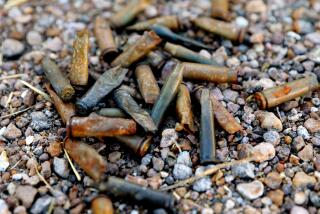Where the Earth Inherits the Meek : INCIDENT AT AKABAL, <i> By Joanne Omang (Houghton Mifflin: $19.95; 313 pp.)</i>
- Share via
In a newspaper story datelined “Jacksonville, FL., Jan. 6, 1897” Stephen Crane told a harrowing tale. The cargo ship Commodore sank while transporting guns from Florida to Cuba. Crane described four men in a 10-foot lifeboat struggling to survive. He reported the facts faithfully. No one reads that account any more.
They read instead his magnificent short story, “The Open Boat.” Newspapers grow cold within a week. Facts soon interest only historians and insurance companies. To transform a story into art, as Crane did, the teller must veer off at the intersection of the facts and the truth.
That’s what Joanne Omang attempts with sporadic success in “Incident at Akabal.” Omang, the Washington Post’s first female foreign correspondent, was already intimately familiar with Latin America by 1985 when another reporter told her of an occurrence in Guatemala two years earlier. That event forms the loose basis of Omang’s novel.
Teen-ager Miguel Angel Kanak, nicknamed Helado (Ice Cream) by his rebel compatriots for his affable coolness, blows up an army barracks and flees to his mountain village of Akabal. Led by Lt. Prospero Gomez, troops track Miguel and issue the villagers an ultimatum: Surrender the boy by dawn or face annihilation.
Omang’s novel explores Akabal’s period of decision and several of the characters involved. There’s Mayor Don Cristobal, the only Ladino (mixed-blood) in this Indian village, who hopes he can preserve Akabal by trusting an army that has never proved trustworthy. There’s Benedicto Tijax, the village’s paid army informant. There’s Father Edmundo, the priest whose standard homilies pale impotently beside army slaughter and liberation theology. There’s Gregorio, Miguel’s best friend, who never knew Miguel was a rebel activist.
On the other side stands Lt. Gomez, whose brother was killed three years earlier by a rebel bomb. Gomez can’t remember “when a dirt road was just a road and not a possible minefield.” He declares the army the defenders of Akabal’s homes and families “against the (communist) subversion that would make slaves of us all.”
To the people of Akabal, however, the army is the ruthless tool of the rich landowners and Americans, mindless killers, fluent only in savagery. The villagers have seen political dissidents disappear and eventually die of “natural causes,” for it is only natural to die when several bullets are fired into your face.
Omang’s female characters--Caterina, the town’s lascivious oracle; Miguel’s long-suffering mother, Flora; Irene, Miguel’s pitiable sister--are colorless. Tellingly, none of the novel’s characters ever quite develops the full blush of life, but the men are at least fired by some political viewpoint.
Both because she places her political agenda ahead of her characters and because her first-novelist brush strokes are obtrusively visible, Omang has not yet made the transition from reporter to artist. Rather than probe the psyches of the villagers agonizing over their choice, Omang focuses on the exploitation of the people and the bleak futility of their world.
These, however, prove provocative themselves. If Omang has not written an expert novel, she has still produced a moving and stimulating tale. She shows the pervasive terror felt in much of Latin America, how the daily lives of its people resemble our childhood dream of falling, where objection so frequently means violent death that people cower ineffectually with little further hope than survival. Here, the Earth has inherited the meek.
Omang raises difficult questions. Akabal, symbolic of the Latin American masses, sees America pulling the soldiers’ strings. Omang depicts a bifocal Yankee myth structure, which creates powerful crosscurrents of foreign policy that cry, “Exploit and control for profit!” in alternating staccato with “We stand for virtue!” Thus, her America cloaks greed with pious justifications: Guns fire in Latin America to ward off Communist bondage.
In a world where the Soviet nerve center of communism is no longer a credible enemy, will we soon claim we must save the descendants of the Mayans from Mitsubishi rather than Castro? Would that play strongly enough to support the rigged elections Omang shows us here, or the foreign aid and disaster relief that seldom reach the people?
If the aspiring artist in Omang has shied away from the decisions facing Akabal, the reporter places in full view the tough questions Akabal raises.
More to Read
Sign up for our Book Club newsletter
Get the latest news, events and more from the Los Angeles Times Book Club, and help us get L.A. reading and talking.
You may occasionally receive promotional content from the Los Angeles Times.






